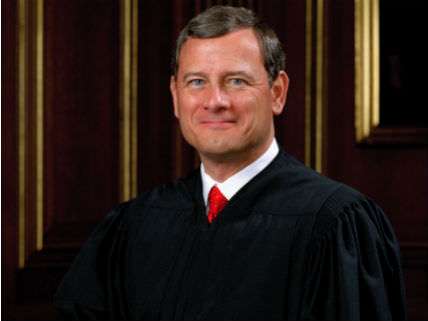Dreaming of a Court That Says No to the Government's Surveillance Requests

The lead story in today's New York Times suggests that Chief Justice John Roberts has been stacking the Foreign Intelligence Surveillance Court (FISC) with government-friendly conservatives. Charlie Savage reports that "86 percent of his choices have been Republican appointees, and 50 percent have been former executive branch officials." The corresponding figures for Roberts' two predecessors, William Rehnquist and Warren Burger, are 66 percent and 39 percent, respectively. "While the positions taken by individual judges on the court are classified," Savage writes, "academic studies have shown that judges appointed by Republicans since Reagan have been more likely than their colleagues to rule in favor of the government in non-FISA cases over people claiming civil liberties violations." He notes that critics troubled by the chief justice's FISCal power have proposed changing the way the judges are appointed.
Although it is plausible that the shift Savage identifies has produced a court somewhat more deferential to the Justice Department's requests, the effect may not be apparent in the day-to-day work of the court, where the government's nearly perfect record probably is due to the weak standards created by Congress. In a recent New York Times op-ed piece, James Carr, a federal judge who served on the FISC from 2002 to 2008, notes that the standard for approving surveillance under FISA is lower than in ordinary criminal cases:
To obtain authority to intercept the phone and electronic communications of American citizens and permanent residents, the government must only show probable cause that the target has a connection to a foreign government or entity or a foreign terrorist group. It does not have to show, as with an ordinary search warrant, probable cause that the target is suspected of a crime.
While "critics note that the court has approved almost all of the government's surveillance requests," Carr writes, it is "the low FISA standard of probable cause," as opposed to "spinelessness or excessive deference to the government," that "explains why the court has so often granted the Justice Department's requests."
That factor, however, does not explain why the FISC has endorsed controversial legal interpretations that give the government much more leeway than the law seems to allow (or the law's authors intended). Section 215 of the PATRIOT Act, for instance, allows the government to seek an order demanding "any tangible things" it deems "relevant" to a terrorism investigation. That is a pretty loose standard (looser even than the one for intercepting Americans' communications), but how can it possibly encompass records of every telephone call in the United States, as the FISC has said it does, unless we read "relevant" to cover any piece of information the government thinks might one day be helpful? That is no standard at all.
Here is where the tilt suggested by Savage may be most important: in decisions that go beyond a yes-or-no response to an application and expound on the meaning of statutes and constitutional provisions, producing the body of "secret law" that critics like Sen. Ron Wyden (D-Ore.) have been decrying for years. "Increasingly in recent years," Savage notes, "the court has produced lengthy rulings interpreting the meaning of surveillance laws and constitutional rights based on procedures devised not for complex legal analysis but for up-or-down approvals of secret wiretap applications. The rulings are classified and based on theories submitted by the Justice Department without the participation of any lawyers offering contrary arguments or appealing a ruling if the government wins." Hence we know about the court's amazingly broad reading of Section 215 (which in principle applies to all records held by third parties, not just telephone metadata) only because of Edward Snowden's leaks.
Given the broad implications of such rulings, Carr argues, the process should be more adversarial, with FISC judges authorized to appoint advocates to argue against the government's position in cases that raise novel issues. While no one speaks for the suspect when police seek an ordinary search warrant, he says, the suspect knows when the warrant is executed, can challenge the validity of the search if he is indicted, and can even seek the return of his property or sue for damages. "These protections are not afforded to FISA surveillance targets," Carr notes.
In his speech at the Center for American Progress this week, Wyden likewise emphasized the importance of letting FISC judges hear from someone who disagrees with the government:
The government lawyers walk in and lay out an argument for why the government should be allowed to do something, and the court decides based solely on the judge's assessment of the government's arguments. That's not unusual if a court is considering a routine warrant request, but it's very unusual if a court is doing major legal or constitutional analysis. I know of absolutely no other court in this country that strays so far from the adversarial process that has been part of our system for centuries.
Wyden also argues that the FISC's rulings should be made public so that Americans understand how their rights have been whittled away in the name of fighting terrorism. Then they can judge for themselves whether their loss of privacy is, as President Obama claims, a "modest encroachment" that "the American people should feel comfortable about."


Show Comments (16)